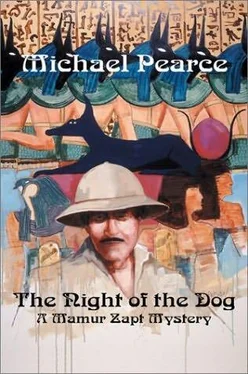Michael Pearce - The Mamur Zapt and the Night of the Dog
Здесь есть возможность читать онлайн «Michael Pearce - The Mamur Zapt and the Night of the Dog» — ознакомительный отрывок электронной книги совершенно бесплатно, а после прочтения отрывка купить полную версию. В некоторых случаях можно слушать аудио, скачать через торрент в формате fb2 и присутствует краткое содержание. Жанр: Исторический детектив, на английском языке. Описание произведения, (предисловие) а так же отзывы посетителей доступны на портале библиотеки ЛибКат.
- Название:The Mamur Zapt and the Night of the Dog
- Автор:
- Жанр:
- Год:неизвестен
- ISBN:нет данных
- Рейтинг книги:3 / 5. Голосов: 1
-
Избранное:Добавить в избранное
- Отзывы:
-
Ваша оценка:
- 60
- 1
- 2
- 3
- 4
- 5
The Mamur Zapt and the Night of the Dog: краткое содержание, описание и аннотация
Предлагаем к чтению аннотацию, описание, краткое содержание или предисловие (зависит от того, что написал сам автор книги «The Mamur Zapt and the Night of the Dog»). Если вы не нашли необходимую информацию о книге — напишите в комментариях, мы постараемся отыскать её.
The Mamur Zapt and the Night of the Dog — читать онлайн ознакомительный отрывок
Ниже представлен текст книги, разбитый по страницам. Система сохранения места последней прочитанной страницы, позволяет с удобством читать онлайн бесплатно книгу «The Mamur Zapt and the Night of the Dog», без необходимости каждый раз заново искать на чём Вы остановились. Поставьте закладку, и сможете в любой момент перейти на страницу, на которой закончили чтение.
Интервал:
Закладка:
Michael Pearce
The Mamur Zapt and the Night of the Dog
CHAPTER 1
The Mamur Zapt would have treated it all as a joke if Nikos, his official clerk, had not been so insistent.
“Get out there quick,” he had said.
He had even volunteered to guide Owen to the Coptic Place of the Dead. Since Nikos was normally reluctant to take a single step outside his office, Owen had been impressed. Even so, if Georgiades had been around he might have sent him. Georgiades, however, was out on an errand of his own, or possibly still in bed. In any case, Nikos made it clear that he would not have approved.
“This is something for the Mamur Zapt,” he said.
The Mamur Zapt was the head of Cairo’s Political CID. Responsible in theory directly to Egypt’s ruler, the Khedive, he answered in practice only to the British Consul-General, the man who, since Britain had charge of Egypt’s purse strings, effectively controlled Egypt. The Consul-General, however, had taken pains not to define the Mamur Zapt’s role too closely, observing that the less he knew of the Mamur Zapt’s activities the more effective he was likely to be.
There were certain ground rules, however, and one of them was that the Mamur Zapt did not concern himself with routine police matters. Which he considered this to be.
“Police?” said Nikos, as if he could hardly believe his ears. “What good would they be?”
Owen had to admit there was something in this. The Cairo police force was recruited from country districts and consisted for the most part therefore of simple fellahin, or peasants, illiterate, underpaid and, when they got to the city, usually quite lost. Their duties tended to be restricted largely to the regulation of traffic, which, since the latter consisted chiefly of donkeys and camels, was in Nikos’s view entirely appropriate. All real criminal investigation was left to the Parquet, the French-style Department of Prosecutions of the Ministry of Justice.
“The Parquet, then?” suggested Owen hopefully.
“The Mamur Zapt,” said Nikos definitely, and put on his tarboosh and walked out of the door.
Owen put on his tarboosh too. Although he was still, strictly speaking, an army officer and merely on secondment, he considered himself now to be a civilian and preferred to dress in mufti. A tarboosh, the pot-like hat with a tassel which was the normal headgear of the educated Egyptian, was far less conspicuous than a sun helmet, especially of the heavy military sort. It was also cooler.
Not that that mattered too much this early in the morning. Later, when the sun was high in the sky and the temperature rose into the nineties, every little thing counted. Even the nature of your hat. At the moment, though, with the sun not long up over the horizon, the day was still pleasantly fresh and cool.
Owen borrowed a couple of constables from the orderly room at the front of the building and set out after Nikos.
They went on foot since their way lay through the mediaeval city, where the streets were too narrow and congested for a carriage to pass. This early in the morning the streets were not, in fact, very crowded. Almost the only people they saw were the black-gowned women drawing water for the day from the street pumps, but by the time they reached the Coptic Place of the Dead there were a lot more people around, and when Owen looked behind him he found that Nikos was not the only guide. From somewhere or other they had acquired a sizeable following of small boys and old men and others who might have been on their way to work if something more interesting had not come along.
Without assistance, although not necessarily on such a scale, Owen would never have found the house of Andrus, for it was set back from the ordinary thoroughfares of the necropolis and masked on all sides but one by huge family tombs. Once it came in sight, however, there was no mistaking it. A large crowd, mostly in the traditional dark gowns and dark turbans of the Copts, had already gathered around its front entrance. As Owen approached, the crowd parted and a man came up to him.
“This is an outrage!” the man said.
“An unfortunate incident, certainly,” said Owen smoothly. Nikos had been able to brief him on the way.
“More than that,” said the Copt, “much, much more than that.”
“Don’t let your distress-”
“They are trying to provoke us,” the man cut in.
“They? Who?”
As soon as he had spoken, he could have cursed himself. For he knew what the answer would be.
“The Moslems,” said the man. “The Moslems. They are behind this.”
“Nonsense!”
It was important to stifle such ideas at birth. Cairo was an excitable city.
“Who else would have done it?”
“Children. Boys.”
“Children!”
“Yes. For a joke.”
“You call this a joke?”
“No. I say only that it is the sort of thing children would do as a joke.”
“We know who did it,” said someone in the crowd, “and it wasn’t children.”
“Nor was it a joke,” said the man who had spoken first. “It was done to provoke us.”
“So you say.”
“So I know,” the man retorted.
“How do you know?”
“This is not a thing in itself. It is part of a pattern.”
“There have been other things?”
“Yes.”
“What things?”
“Attacks on Copts in the streets. Women jostled on their way to church. Our priests spat on, children stoned.”
“These are all bad things,” said Owen, “but that is not enough to make a pattern.”
“What more do you want?” asked the man. “Someone killed?”
“In a pattern,” said Owen, “there is design.”
“There is design here. Do you think these things happen by chance?”
“Women have always been jostled. Boys have always thrown stones.”
“But not like this,” said the man. “Our women dare not go out. We keep our children at home.”
“There have been many such incidents?”
“Every day and increasingly.”
“In one part of the city or in all?”
“At the moment,” said the man, “in one part of the city only.”
“And that is?”
“We are from the Mar Girgis,” said the man. The Church of St. George, in the old part of the city, Owen thought. He had walked past it on his way to the cemetery.
“It is around there, is it?”
“Yes.”
He became aware that the man was watching him closely.
“If you do not do something about it,” the man said, “we shall.”
The crowd went quiet. Owen suddenly noticed how much it had grown. It must be over two hundred. And with that realization came another. Not all of them were Copts.
“We have endured too much too long,” the man said. “It is time to make an end of it.”
“That is not for you,” said Owen coldly. “It is for the Mamur Zapt.”
This was ridiculous. To flare up over a thing as trivial as this! But he knew that was how things did catch fire in Cairo, and also that once started the fires were hard to put out.
“I will do something about it,” he said.
“Do so!” said the man. “And do it quickly. For we will not wait.”
The Mamur Zapt did not reckon to take this kind of talk from anyone, and he looked round for the police. But there were only two of them, huddled uneasily behind him. For the moment he could do nothing.
But he would have to do something. He couldn’t leave the crowd like this. For the moment, the man seemed to have them in hand, but he could as easily incite as restrain. And if he did so, what would become of the Moslems present? There were only a few of them compared to the Copts. And what the hell were they doing here, anyway? You’d think they’d have enough sense to get out, fast.
Читать дальшеИнтервал:
Закладка:
Похожие книги на «The Mamur Zapt and the Night of the Dog»
Представляем Вашему вниманию похожие книги на «The Mamur Zapt and the Night of the Dog» списком для выбора. Мы отобрали схожую по названию и смыслу литературу в надежде предоставить читателям больше вариантов отыскать новые, интересные, ещё непрочитанные произведения.
Обсуждение, отзывы о книге «The Mamur Zapt and the Night of the Dog» и просто собственные мнения читателей. Оставьте ваши комментарии, напишите, что Вы думаете о произведении, его смысле или главных героях. Укажите что конкретно понравилось, а что нет, и почему Вы так считаете.












